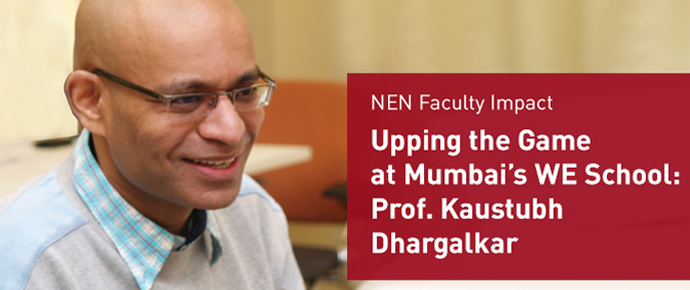Upping the Game at Mumbai’s WE School
In November 2011, Priyanka Amar wrote a business plan for a venture that would help set up urban farms or kitchen gardens in densely populated Mumbai. She was a student of the Business Design Program at the WE School (Welingkar Institute of Management Development & Research), where she was being mentored by NEN Faculty Leader Professor Kaustubh Dhargalkar.
Having worked on kitchen gardens at home, Priyanka was keen on turning her hobby into a profession. Kaustubh vetted her plan, and helped her conduct an extensive market research to understand her potential venture’s growth prospects. She started testing her plan soon after graduation with just one maali (gardener), and an investment of INR 50,000 from her personal savings. Kaustubh helped her in networking with customers, including households, builders and corporates, and reaching out to investors. He had also helped plan for scaling up, getting visibility and brand positioning.
Cut to 2014, Priyanka’s business plan has bloomed into a fully-fledged venture called iKheti, which boasts a growing list of customers. Today, her team has grown to eight, and Priyanka even plans to raise her first round of capital soon! Reflecting on this, Priyanka credits her mentor for showing her the right direction – and helping her decide to take up entrepreneurship, instead of opting for placements!
Kaustubh joined Welingkar as a professor in 2006. His interest in entrepreneurship soon had him reaching out to the National Entrepreneurship Network to engage in the network’s faculty programs and activities for entrepreneurship development. This helped him set up Welignkar’s first student-led Entrepreneurship Cell, which aimed to encourage and support entrepreneurial aspirations among the school’s students.
In the last three years (2010 – 2013), more than a dozen businesses have been started by students on the WE School campus, and many of them continue to build their ventures even after passing out. Apart from iKheti, Campus Companies that became full-fledged ventures include Opulent Infotech, Vibrant Holidays, and Zapp Party Solutions.
Driving Innovation on Campus
In 2008, Kaustubh helped launch an “innovation lab” at Welingkar called the InnoWE Center for Innovation and Memetics. One of the key focus areas for the lab was to help businesses improve their ability to analyze and solve problems, and innovate, using design-thinking methodologies. This effort crystallized into a popular program called Business Design Management, which integrates design thinking and innovation processes with mainstream management subjects. The program includes a credit-based elective on entrepreneurship in the second year, for which Kaustubh incorporated inputs from the several NEN courses he had attended. Additionally, his own experience as an entrepreneur – he had a 15-year stint founding and running companies, before moving into teaching – helped him provide students a practical understanding of entrepreneurship. InnoWE’s focus on Memetics also helped students explore the relationship between socio-cultural trends and business opportunities.
The innovation lab turned out to be a pioneering concept – the earliest such initiative at any B-school in the country. Completely self-funded by the institute, it is open to all students on campus and serves as a space for students to brainstorm and prototype their ideas. According to Kaustubh, “It has become a magnet, attracting more students and serving as an effective support system for ventures.” InnoWe also organizes activities like ideation contests, concept shows, meetings with entrepreneurs, and more.
The success of the lab and the impact of Kaustubh’s innovation-centric approach are evident in the number of students associated with the Business Design Program. From just 30 students initially, over 60 students are part of the program today. Many of these students are actively starting new ventures based on what they have learnt in the lab.
Investing in Personal Growth
Kaustubh juggles several critical roles in the entrepreneurship education ecosystem today. While he is Associate Dean for Business Design and Innovation program, and the Head of the innovation lab InnoWE Center at WE School, he is also a Mentor at the Centre for Innovation and Enterprise at IIM Ahmedabad. Additionally, he facilitates workshops for entrepreneur associations, and contributes articles at a number of publications.
Over the years, Kaustubh has sought out various entrepreneur educator courses to enhance his own learning. In 2007, he attended the year-long NEN Entrepreneurship Educator’s Course (EEC), comprising a series of Faculty Development Workshops, co-developed by NEN and Stanford University’s Technology Ventures Program (STVP). Training under international entrepreneurship educators like Tina Seelig from Stanford and John Mullins from London Business School helped him develop programs for his own students.
While the Entrepreneurship Educator’s Course gave Kaustubh the knowledge and skills to start facilitating entrepreneurship courses for students, Tools for Growth, a mentor development course that Kaustubh attended in 2010, enabled him to support early- and growth-stage entrepreneurs. Conducted by NEN in association with Goldman Sachs 10,000 Women Program and London Business School, Tools for Growth equips participating educators with the knowledge and frameworks needed to assess growth opportunities, manage cash for growth, and develop organizational capabilities.
In 2011, Kaustubh participated in the Cherie Blair Foundation for Women (CBFW) – NEN Mentor Development Program. Through its combined modules on Marketing and Entrepreneurial Finance, the program provides educators practical knowledge on assessing market opportunities, pricing techniques, developing product offerings, analyzing financial valuations, determining right financing options, and more.
Supporting Community Entrepreneurs
A key feature of the Mentor Development Program was that it ensured participating mentors apply their learning by working directly with entrepreneurs who are part of the program. Kaustubh was assigned Savita Rajeev, who had founded Springs Innovations to foster the creative thinking among school children and college students. In the five years, Savita had executed over 130 projects, impacting more than 3000 children. However, financially, her venture was struggling.
As Kaustubh and Savita began to work together, they realized that while Spring Innovations’ aimed to build creativity among students, its service offerings weren’t tangible and clear, and were failing to make an impression with potential customers. This was when Kaustubh helped Savita focus on identifying and profiling her market. His incisive questions helped her zero in on her real potential customers and understand their requirements and challenges. He encouraged her to focus on revenue-generating options, even as she worked on improving her marketing and positioning to connect more clearly with her customers.
By the end of this exercise, Savita realized that her customers weren’t restricted to school, colleges or parents, but also included corporate organizations that were looking to instill innovative and creative thinking abilities in their employees. Savita soon bagged contracts with Kokuyo Camlin, Kelloggs and others Fortune 500. Thanks to Kaustubh’s guidance, she was able to dramatically increase her impact, reaching six times the number of young people that she could earlier in a given time.
“Kaustubh helped me steadily gain confidence in my ideas, decisions and most importantly, my imagination,” says Savita.
Most recently, on his campus, Prof. Kaustubh has facilitated a tie-up between WE School and Massachusetts Institute of Technology for a Venture Mentoring Platform. We School has now set up a formal six member mentoring board on campus to support entrepreneurs. Kaustubh himself is currently supporting 5 student entrepreneurs and an equal number of practicing entrepreneurs; 12 students mentored by him have successfully started ventures in the last three years.
Prof. Kaustubh is not just an inspiring entrepreneurship educator and mentor, evangelizing entrepreneurship on campus and in the community. He is a driving force behind various initiatives on campus, such as the Business Design Program, and We School’s cutting edge focus on innovation. He is clear proof of the heights faculty can reach when it comes to equipping themselves, tapping into community resources, and making an impact on the entrepreneurial ecosystem.


